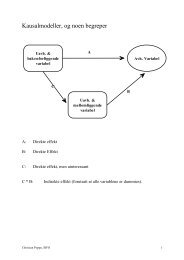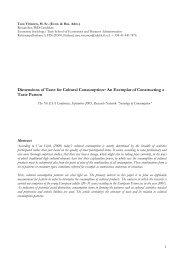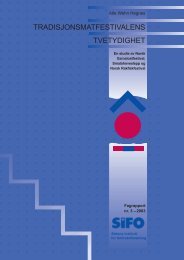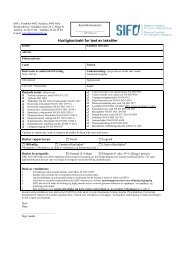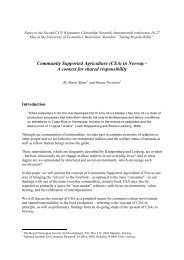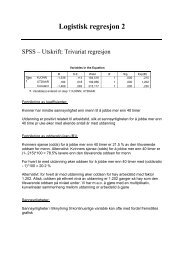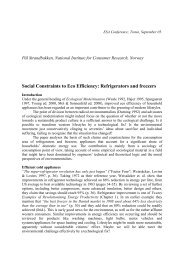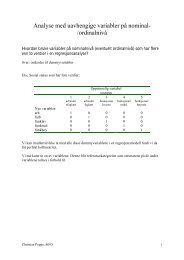download PDF - Sifo
download PDF - Sifo
download PDF - Sifo
Create successful ePaper yourself
Turn your PDF publications into a flip-book with our unique Google optimized e-Paper software.
PUBLIC/PRIVATE INITIATIVES:KINDERGARTEN & SCHOOLSOBESITY GOVERNANCE: Partnership, healthy eating and innovativegovernance as tools to counteract obesity and overweightMaria Loureiro , University of Santiago de Compostela, SpainRocío Domínguez Álvarez, University of de Santiago de Compostela, SpainWith Collaboration of: Andreas Drichoutis, Univ. of Ioannina, GreeceAchilleas Vassilopoulos, Agricultural Univ. of Athens, GreeceGeof Rayner, UK and many others…September,2011
IntroductionObesity and overweight are worldwide recognized as one ofthe most serious health concerns on 21st century. According World Health Organization (WHO), between 1995and 2010: Adults obesity grow up from 200 to 500 million Children aged under-five with overweight problems grow up from 18 to43 million.
Obesity in EuropeSource: “The Challenge of obesity in the WHO European Region and the strategies for response”,World Health Organization 2007
Obesity in Europe Spain and Portugalreport overweight andobesity levels exceeding30% among childrenaged 7-11. In addition Germanyreports overweight levelsof 10-20% among thisage group too.Source: International Obesity Task Force, March 2005
List of cases (partnerships)Generation XXI (Portugal)Health Day Care (Germany)EPODE (France)PAIDEIATROFI (Greece)THAO (Spain)VIASANO (Belgium)Incredible Edibles (Ireland)Food Dudes (Ireland)NutriKids (Hungary)Moving Kids /Kids Motion(Spain)Keep Fit (Poland)
Public-Private Partnerships (PPP) PPP involves at least one private profit organization andone non profit or public organization. All partners havethe same objectives for the creation of social value. Themain purposes are achieved when the program´s effortand benefit are shared. (Public and Private Partnership forPublic Health) Two differences between PPPs and privatizationorganizations: Public administration is a fundamental aspect The contracts are periodically reassigned
Background for the initiatives Addressed to schoolchildren and teenagers up to15 years old and in most cases to their familiesas well Common Goal: prevention of obesity throughchanging awareness about healthy eating,changing the school/home environment andsocial norms → Education (Exception: KidsMotion → treatment of overweight/obesity →engaging children in physical activity; extended toinclude adolescents)
What stakeholder groupsparticipated in the planning?EPODE type initiatives:• communication agency , private companies (e.g., Nestle), scientificcommittees, local/national authorities, regional/local public entities, NGOs(THAO, EPODE)• Initiatives were copied from France; role of other actors besides centralcoordinator, was limitednon-EPODE type initiatives:• Food Dudes → Bangor University in Wales, then adopted in UK, receivesfinancial support from government of Ireland, European Commission as wellas the food industry and the Food Standards Agency in the UK.• Incredible edibles → charitable trust (Agri-Aware), the Irish Food Board,private companies and schools• Moving Kids , NutriKids → health and nutrition professionals; doctors andthe national dietetic association respectively
Obesity Programs: Kids MotionTarget population: children between 4 and 12 years old who haveoverweight or exogenous obesity and their parents. Recently it hasspread to children between 13 and 18 years old.Method: 11 meetings where parents and children receive similarinformation. Each session used cognitive behavioral techniques, andanother related to self-control, corporal image, self-esteem,relaxation and movement among others.Aims: change overweight family´s lifestyles like diet or physicalactivity. Moreover, it includes emotional treatment.Developed by: Hospital Vall d´Hebron of Barcelona, but also inSpain´s Primary attention Centers and 3 hospitals of Mexico andArgentina.
Results Kids Motion In 2010: 94.3% of the total participants decreased Body Mass Index(BMI) and percent of body fat. An improvement in the quality of their Mediterranean diet. number of children who did not eat breakfast declined andincreased their consumption of fruits, vegetables and fish. Treatment of anxiety and depression was successfully completed. Self-Steem and body satisfaction of children increased.
Paideiatrofi (by EPODE), GreeceAims at:ToolsStakeholders• The aim ofPAIDEIATROFI is tocreate the politicalcommitment,resources, supportservices and evidencebase to enablecommunitystakeholders toimplement effectiveand sustainablestrategies to preventchildhood obesity• Games specially designedto educate young childrenabout the benefits of ahealthy diet and physicalactivity :• «The taste of the season:The Vegetables! »• «Easy, Economic andHealthy Eating »• « The taste of the season:The Fish! »• «The Family Table! »• «Water and Hydration! »• «Desserts! »• "Breakfast: my secretweapon!"• "We move and we likethis!'• 'The Taste of the season:The Fruits!'• Ministry of Health and SocialSolidarity• Ministry of Education, LifelongLearning and Religious Affairs -General Secretariat for Youth• Ministry of Economy,Competitiveness and Shipping-General Secretariat for Consumers• Intermunicipal Health & SocialSolidarity Network• Hellenic Paediatricians College• Hellenic Society of Child andAdolescent Endocrinology• Pan-Hellenic Association ofDieticians & Food Technologists• Hellenic Association of Dieticians &Nutritionists• Hellenic Institute ofGastroenterology and Nutrition• Hellenic Society of Endocrinology• Hellenic Medical Society ofObesity• Foundation Aristides Daskalopoulos• Society for the Study of RiskFactors for Vascular Diseases
Obesity Programs: ThaoTarget population: specially focused on preventing childhoodobesity on children between 0 and 12 years old.Method: 2 important steps. First, to inform those involved inchildren´s environment to try to avoid the tendency to weightgain. Second, teach health professionals to detect overweightchildren and start treating them.Aims: To promote healthy eating habits and encourage childrento do physical activities.Developed by: Thao Foundation in Spain. The program isimplemented in Spanish municipalities. It started on 5municipalities. At the moment there are involved 84 town councils
Results Thao In 2008-2009: There were a total of 20.49% obese and overweight children. In particular, 9.26% were obese and 11.23% overweight. In 2009-2010: There were a total of 29.3% obese and overweight children. In particular, 8.2% were obese and 21.1% overweight. 2009-2010: Santiago de Compostela There were a total of 27.30 obese and overweight children. In particular, 4.78% were obese and 22.52% overweight
Obesity programs: The XXI GenerationProjectTarget Population: Newborns, in order to monitor themthroughout their growth.Method: Newborns should go to a medical consult twice a year.Doctors control child´s physical and motor situation, behavior,dietary needs and diseases, etc.Aims: Acquire new knowledge to reach a better understandingof Portugal´s challenges on current health in childhood,adolescence and adulthood.Developed by: Five maternity units in the Porto metropolitanarea. All mothers who delivered a live-born child between April2005 and August 2006 were eligible and invited to join thestudy.
Results XXI Generation Project In 2005-2006: Obese women were less frequently former smokers thanunderweight women 21.3% were overweight and 8.8% were obese beforepregnancy BMI were inversely associated with smoking It was observed a lower prevalence of overweight andobesity in primigestae
Keep FitStakeholders: Polish Federation of Food Industry, ChiefSanitary Inspectorate, Consumer Federation, scientificinstitutions (National Food and Nutrition Institute andMother and Child Institute), patronated by the Ministry ofHealth, Ministry of Education, Ministry of Sports andPhysical Activity.Output: 7,000 schools (3 million pupils) in the wholePoland. Target groups: Pupils from secondary schools (13-15years).Aim: Improvement of the knowledge about the propernutrition and physical activity.
Results: Keep FitIn 2009/2010 schoolyear, the detailed monitoring of theprogramme was conducted (12,000 adolescents and theirparents).The monitoring showed that adolescents involved in theprogram in comparison to adolescents not involved changedtheir dietary habits (e.g. eat 5 meals a day more likely, eatsweets less frequently, consume vegetables more often) andpractice sport more regularly.
Obesity Programs: Healthy Day Care Target population: Children between 0 and 6 years old. Method: Nurseries are coached and trained to developed ahealthy lifestyle focused on well-balanced diet, sufficientactivity and space for relaxation. Nurseries can have a“health dialogue” with children´s parents. Aims: To implement obesity prevention strategies innurseries on a day-to-day, long term basis Developed by: 46 nurseries in four geographic areas(Augsburg, Bielefeld, Mühlheim on Ruhr and Munich)
Results Healthy Day Care No information was obtained about actual changes indiet, activity levels or obesity rates of children The initiative resulted in healthier diets, more activityand greater room for relaxation in nurseries that tookin the interventions.
Resultsoutcome-orientedoutput-orientedAvailable for all schoolbasedinterventionswithinsubjectsdesignMovingKidsDirectTHAOMoving KidsBetweensubjectsdesignEPODEtypewithinsubjectsdesignMovingKidsIndirectTHAOKids MotionFood DudesKeep FitBetweensubjectsdesignFoodDudesKeep FitTHAO
Obesity Programs Analyses All of the programs have the purpose of contributing tohealth gains among population. Kids Motion and Healthy Day Care also focus on promotingchange in overweight family´s lifetime. XXI Generation is concentrated on acquiring new knowledge oncurrent health status in different stages of life.
Obesity Programs Analyses (II) The main stakeholders involved are scientific andpractitioners experts, the private sector as well as localpublic entities. Additional authorities were also involved inThao and Healthy Day Care. All projects are funded by private and/or publicstakeholders. All the initiatives were adapted to local conditions duringthe implementation, since each particular region has theirown characteristics. The management of each initiatives varies among thedifferent programs.
Obesity Programs Analyses (III)EPODE type initiatives has been transferrednon-EPODE type initiatives:• Food Dudes is starting in• Sicily (2009-2010, 3 schools 345 pupils)• U.S.A (Utah and California) Kids Motion transferred to Mexico and Argentina
Conclusions Obesity programs have an important role in promoting healthyeating habits and physical activity. Results have shown that PPPs have a relevant role indeveloping strong relationships between the different societysector. Each obesity program ought to be adapted to the localconditions. It is required to enable the entire community tocreate a healthy environment. It is important that participants are coached and trained forthe effective development of the main activities and moreover,the initiatives should be diffused.
Conclusions (II) It is firmly recommended that programs would befocused on changing dietary habits and unhealthybehaviors (longer term goals). Results also suggest that programs are successful whenpromoting physical activity and emotional treatment notonly for children but also for the whole family.



